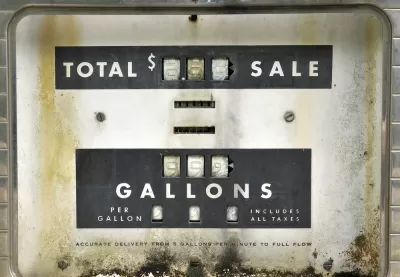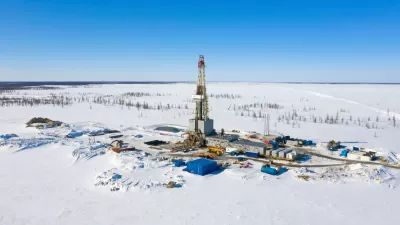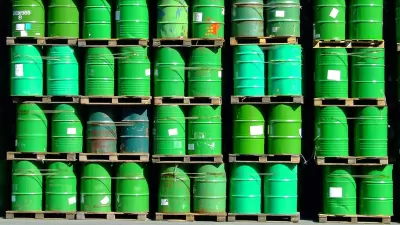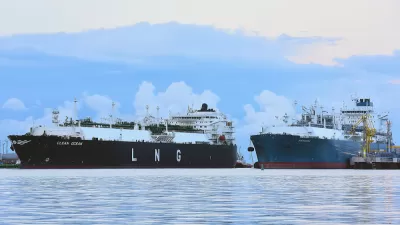President Biden took aim at Russia in his State of the Union address for the war it has started in Ukraine, vowing that they will "pay a price" which so far has yet to extend to their oil and gas exports.

"President Biden vowed on Tuesday to make President Vladimir V. Putin of Russia 'pay a price' for invading Ukraine, seeking to rally the world as Moscow’s forces rained down missiles on Ukrainian cities and prepared to lay siege to the capital of Kyiv," reported Peter Baker, chief White House correspondent for The New York Times, on March 1.
No president had delivered his State of the Union address with such a large-scale and consequential land war underway in Europe since 1945, and Mr. Biden faced the challenge of holding together multinational and bipartisan alliances to counter Mr. Putin.
The previous week, President Biden addressed the nation on February 24 after the Russian invasion had begun. "Today, I’m authorizing additional strong sanctions and new limitations on what can be exported to Russia," he said from the White House. "This is going to impose severe costs on the Russian economy, both immediately and over time."
"I know this is hard and that Americans are already hurting. I will do everything in my power to limit the pain the American people are feeling at the gas pump. This is critical to me."
No doubt that "pain at the pump" was one of the major reasons for not extending sanctions to the energy sector. However, Biden is not alone in keeping Russia's extensive oil and gas exports flowing.
Europe's dependence on Russian gas
"In the hours after the invasion of Ukraine, there were calls for Europe to punish Russia by ending energy purchases," wrote Bloomberg News correspondents Elena Mazneva and Anna Shiryaevskaya on February 24.
But the immediate response of European energy companies was to buy more natural gas, much of it transported through Ukraine’s pipeline network.
Europe’s first war of the 21st century has highlighted its dependence on Russian energy supplies. A third of gas demand is met through pipelines from Siberian gas fields, giving [Russian] state-run Gazprom billions in revenue every year. Cutting off those supplies would cause gas prices to skyrocket and threaten power cuts. Oil and gas were exempted from the package of sanctions announced by the U.S. and European Union on Thursday.
"Europe’s attachment to Russian gas remains a significant liability, playing a role in the apparently joint U.S.-E.U. decision Thursday to hold off from excluding Russia from a global banking network known as SWIFT," reported The Washington Post on February 24. On Saturday, the sanctions extended to cutting off key Russian banks from SWIFT.
Energy exemption
The energy carve-out to protect American motorists from rising gas prices and Europeans from rising heating and power bills is the subject of the source article (listen here) by politics and economics writer Josh Boak for The Associated Press on February 27.
“Energy exports are the whole game,” said Columbia University historian Adam Tooze, an expert on finance and European politics.
Politicians in the United States and Europe chose to “carve out the one sector that might truly be decisive. I don’t think Russia is blind to what is going on and it must indicate to them that the West does not really have the stomach for a painful fight over Ukraine.”
Boak reports that the aforementioned "key Russian banks" that were cut off from SWIFT on February 26 did not include non-U.S. banks that handle Russian energy transactions. The reason for the exemption: the "sanctions are designed to minimize any disruptions to the global energy markets."
We've been here before
Two posts from March 2014 related to the Russian annexation of Crimea:
- Are Environmentalists Digging Their Own Fracking Hole in Opposing Natural Gas Exports? March 24, 2014
- Natural Gas Dependence Hobbles Western Response to Crimean Crisis, March 11, 2014
Other related posts:
- Subways as Shelters, February 27, 2022
- Just What the World Needs: $20 Per Barrel Oil, March 10, 2020
- Pipeline Politics Ruffle NATO Summit, July 15, 2018
- Russia Takes its Own Route to Auto Efficiency (Gazprom promotes natural gas-powered vehicles), April 12, 2013
- Mass Demonstration Opposes St. Petersburg Highrise (Gazprom to build high-rise HQ), March 18, 2007
FULL STORY: Biden’s Russia sanctions may let Moscow profit from oil, gas

Study: Maui’s Plan to Convert Vacation Rentals to Long-Term Housing Could Cause Nearly $1 Billion Economic Loss
The plan would reduce visitor accommodation by 25,% resulting in 1,900 jobs lost.

North Texas Transit Leaders Tout Benefits of TOD for Growing Region
At a summit focused on transit-oriented development, policymakers discussed how North Texas’ expanded light rail system can serve as a tool for economic growth.

Why Should We Subsidize Public Transportation?
Many public transit agencies face financial stress due to rising costs, declining fare revenue, and declining subsidies. Transit advocates must provide a strong business case for increasing public transit funding.

How to Make US Trains Faster
Changes to boarding platforms and a switch to electric trains could improve U.S. passenger rail service without the added cost of high-speed rail.

Columbia’s Revitalized ‘Loop’ Is a Hub for Local Entrepreneurs
A focus on small businesses is helping a commercial corridor in Columbia, Missouri thrive.

Invasive Insect Threatens Minnesota’s Ash Forests
The Emerald Ash Borer is a rapidly spreading invasive pest threatening Minnesota’s ash trees, and homeowners are encouraged to plant diverse replacement species, avoid moving ash firewood, and monitor for signs of infestation.
Urban Design for Planners 1: Software Tools
This six-course series explores essential urban design concepts using open source software and equips planners with the tools they need to participate fully in the urban design process.
Planning for Universal Design
Learn the tools for implementing Universal Design in planning regulations.
Ascent Environmental
Borough of Carlisle
Institute for Housing and Urban Development Studies (IHS)
City of Grandview
Harvard GSD Executive Education
Toledo-Lucas County Plan Commissions
Salt Lake City
NYU Wagner Graduate School of Public Service





























